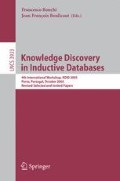Abstract
Many data mining algorithms make use of the well-known Inclusion-Exclusion principle. As a consequence, using this principle efficiently is crucial for the success of all these algorithms. Especially in the context of condensed representations, such as NDI, and in computing interesting measures, a quick inclusion-exclusion algorithm can be crucial for the performance. In this paper, we give an overview of several algorithms that depend on the inclusion-exclusion principle and propose an efficient algorithm to use it and evaluate its complexity. The theoretically obtained results are supported by experimental evaluation of the quick IE technique in isolation, and of an example application.
Access this chapter
Tax calculation will be finalised at checkout
Purchases are for personal use only
Preview
Unable to display preview. Download preview PDF.
References
Agrawal, R., Srikant, R.: Fast algorithms for mining association rules. In: Bocca, J.B., Jarke, M., Zaniolo, C. (eds.) Proceedings 20th International Conference on Very Large Data Bases, pp. 487–499. Morgan Kaufmann, San Francisco (1994)
Borgelt, C., Kruse, R.: Induction of association rules: Apriori implementation. In: Härdle, W., Rönz, B. (eds.) Proceedings of the 15th Conference on Computational Statistics, pp. 395–400. Physica-Verlag (2002), http://fuzzy.cs.uni-magdeburg.de/~borgelt/software.html
Boulicaut, J.-F., Bykowski, A., Rigotti, C.: Approximation of frequency queries by means of free-sets. In: Zighed, D.A., Komorowski, J., Żytkow, J.M. (eds.) PKDD 2000. LNCS (LNAI), vol. 1910, pp. 75–85. Springer, Heidelberg (2000)
Bykowski, A., Rigotti, C.: A condensed representation to find frequent patterns. In: Proc. PODS Int. Conf. Principles of Database Systems (2001)
Calders, T., Goethals, B.: Minimal k-free representations of frequent sets. In: Proc. PKDD Int. Conf. Principles of Data Mining and Knowledge Discovery, pp. 71–82 (2002)
Calders, T., Goethals, B.: Mining all non-derivable frequent itemsets. In: Elomaa, T., Mannila, H., Toivonen, H. (eds.) PKDD 2002. LNCS (LNAI), vol. 2431, pp. 74–85. Springer, Heidelberg (2002)
Jaroszewicz, S., Simovici, D.A.: Support approximations using bonferroni-type inequalities. In: Elomaa, T., Mannila, H., Toivonen, H. (eds.) PKDD 2002. LNCS (LNAI), vol. 2431, pp. 212–224. Springer, Heidelberg (2002)
Knuth, D.E.: Fundamental Algorithms. Addison-Wesley, Reading (1997)
Kryszkiewicz, M., Gajek, M.: Why to apply generalized disjunction-free generators representation of frequent patterns? In: Proc. International Syposium on Methodologies for Intelligent Systems, pp. 382–392 (2002)
Mannila, H.: Local and global methods in data mining: Basic techniques and open problems. In: Widmayer, P., Triguero, F., Morales, R., Hennessy, M., Eidenbenz, S., Conejo, R. (eds.) ICALP 2002. LNCS, vol. 2380, p. 57. Springer, Heidelberg (2002)
Mannila, H., Toivonen, H.: Multiple uses of frequent sets and condensed representations. In: Proc. KDD Int. Conf. Knowledge Discovery in Databases (1996)
Meo, R.: Theory of dependence values. ACM Trans. on Database Systems 25(3), 380–406 (2000)
Moore, A., Lee, M.S.: Cached sufficient statistics for efficient machine learning with large datasets. Journal of Artificial Intelligence Research 8, 67–91 (1998)
Pavlov, D., Mannila, H., Smyth, P.: Beyond independence: Probabilistic models for query approximation on binary transaction data. IEEE Trans. on Knowledge and Data Engineering 15(6), 1409–1421 (2003)
Savinov, A.: Mining dependence rules by finding largest support quota. In: ACM Symposium on Applied Computing, pp. 525–529 (2004)
Silverstein, C., Brin, S., Motwani, R.: Beyond market baskets: Generalizing association rules to dependence rules. Data Mining and Knowledge Discovery 2(1), 39–68 (1998)
Zheng, Z., Kohavi, R., Mason, L.: Real world performance of association rule algorithms. In: Proc. KDD Int. Conf. Knowledge Discovery in Databases, pp. 401–406. ACM Press, New York (2001)
Author information
Authors and Affiliations
Editor information
Editors and Affiliations
Rights and permissions
Copyright information
© 2006 Springer-Verlag Berlin Heidelberg
About this paper
Cite this paper
Calders, T., Goethals, B. (2006). Quick Inclusion-Exclusion. In: Bonchi, F., Boulicaut, JF. (eds) Knowledge Discovery in Inductive Databases. KDID 2005. Lecture Notes in Computer Science, vol 3933. Springer, Berlin, Heidelberg. https://doi.org/10.1007/11733492_6
Download citation
DOI: https://doi.org/10.1007/11733492_6
Publisher Name: Springer, Berlin, Heidelberg
Print ISBN: 978-3-540-33292-3
Online ISBN: 978-3-540-33293-0
eBook Packages: Computer ScienceComputer Science (R0)

